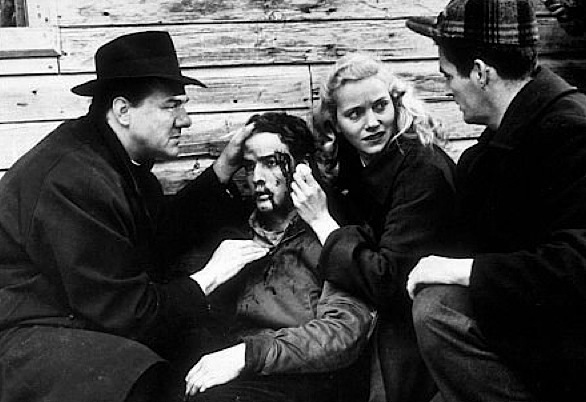Karl Malden, who won an Academy Award for one of the best American films and became a household name for a TV commercial, is dead at 97. He died at home in Brentwood of natural causes, according to his family.
Malden won his Oscar for the film adaptation of Tennessee Williams’ “A Streetcar Named Desire” (1951), playing opposite Marlon Brando and Vivien Leigh. He acted with Brando again in “On the Waterfront” (1954), for which he was nominated. He and Brando had started on Broadway together in 1945.
His toughest physical acting challenge, he once told me, came during the filming of “On the Waterfront,” in a scene where he plays a priest in standing in the cargo hold of a ship, trying to bring peace to a labor dispute. The screenplay called for him to be hit in the head with a beer can. Director Elia Kazan called for more than one take.
“It had to be a full beer can, because an empty one would bounce wrong,” he said during an onstage discussion at the USA Film Festival in Dallas. “It didn’t feel real good bouncing off my skull. Father Barry has no way of knowing he’s about to be hit. Of course I knew, because the cue was a particular word of dialogue. I found it incredibly hard to keep my face blank before the can hit. Next to that, the acting part was easy.”
Malden, reminding viewers “Don’t leave home without it,” starred in a popular series of TV commercials for the American Express card in the 1970s and 1980s.
“After 50 years of doing all those other things in the business,” he once told the Los Angeles Times, “wherever I go, the one thing people will say to me is, ‘Don’t leave home without it.’ What am I going to say? It’s kind of frustrating in a way, but at the same time, American Express has been very good to me, and it’s given me independence. I don’t have to jump at anything and everything that comes my way.”
He was born named Mladen Sekulovich, on March 22, 1912 in Chicago, the son of a Czech mother and a Serbian father. The family moved to Gary, Ind., where his father worked in the steel mills and then became a milkman. Malden himself was a steelworker from 1931 to 1934. He was asked to shorten his name by his first drama company, and said he always regretted that. As an in-joke, he succeeded in working the name Mladen Sekulovich into the screenplays of “On the Waterfront,” “Birdman of Alcatraz,” “Fear Strikes Out,” and “Patton,” in which he played Gen. Omar Bradley. In the popular TV series The Streets of San Francisco, his character employed an assistant with the name.
Having started acting in high school in 1937, he moved to New York to try his luck on Broadway. In the 1930s there was a market for proletarians who looked like they’d knocked around a little, and he was accepted into Lee Strasberg’s Group Theater. He served in World War Two as a noncommissioned officer in the 8th Air Force. His first significant movie role was in “The Gunfighter” (1950), and he often played in Westerns, film noir and realistic dramas — and even in a musical, “Gypsy.”
In addition to his more famous films, he excelled in Alfred Hitchcock’s “I Confess” (1953), Otto Preminger’s “Where the Sidewalk Ends” (1950), Kazan’s “Baby Doll” (1956), “One-Eyed Jacks,” the only film Brando ever directed, and John Ford’s “Cheyenne Autumn” (1964).
He was a president of the Academy of Motion Picture Arts and Sciences, and was proud of his service until this year on a U.S. Postal Service citizen’s advisory board recommending subjects for U. S. stamps.
Malden was a much loved, straightforward, plain-spoken family man who rarely made a gossip column and was married since 1938 to Mona Greenberg, who survives him. It was one of Hollywood’s longest running marriages. He is also survived by daughters Mila and Carla, three grandchildren and four great-grandchildren.
His film career bridged seven decades. “People have told me that I came to this industry at its Golden Age,” he once said. “But when I was there, it was just an age.”












